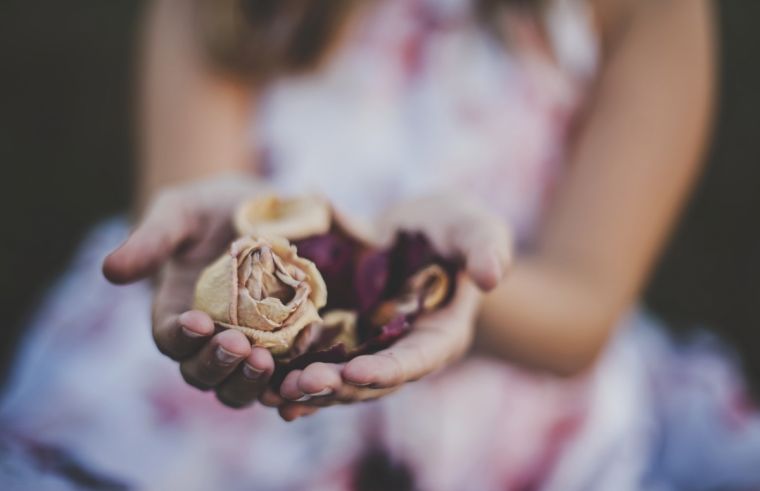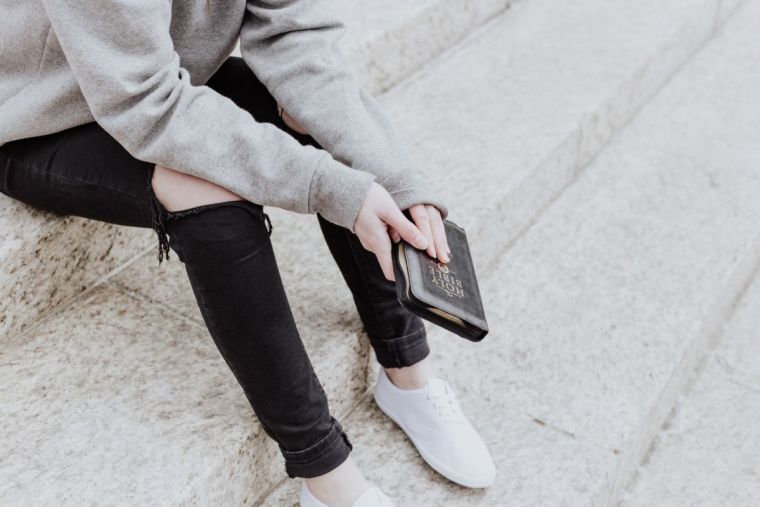The problem with God's omnipotence

No one gets to skip the tough stuff. And I slammed into mine while sitting on a blue pleather hospital chair a well-intentioned interior decorator probably thought would be comforting. In reality nothing could soften the blow; I had cancer.
Eight years ago my mum had died of her "something" - lung cancer - and just six weeks before I'd held my sister's hand as that same "something" had taken her.
Now it seemed I had my own something - rectal cancer.
Rectal cancer isn't sexy and doesn't come with a pretty pink bow, just the normal onslaught of cancer fighting radiation, chemo, surgery, and more chemo, along with the added complexity of an ostomy bag.
In addition to all the appointments, drugs, and medical paraphernalia, I found myself drowning in questions about God, my faith, and whether it was actually all just smoke and mirrors.
As a pastor's wife, church planter, self-confessed optimist, and someone who's seen God move in the most ridiculously outstanding ways, I've always been able to reconcile the suffering both out in the world and closer to home with my omnipotent, loving, and merciful God.
You may well wrap your head around pain in the same way. God created a perfect world, but when we messed it up, sin entered the world with pain, suffering, and death galloping in hot on its heels.
So God, in His love and mercy, sent Jesus to sort it out and reconcile us to Him through His death and resurrection.
The bad news is, the world is broken so there's pain and suffering around us, but the good news is, God sent Jesus so we don't need to suffer alone.
Don't get me wrong. As the words 'cancer' and 'lymphoma' hung in the air, nothing had changed. I still believed this one hundred per cent. And yet everything had changed, because this time it was personal. This time I was the one in pain and my wrestling was for answers to my own suffering.
It had moved from a head question; a theological question I could park at the end of someone else's hospital bed, to being an unwelcome personal one that snuggled in bed with me while the morphine dripped into my arm.
When pain unexpectedly shifts from being a distant, abstract conundrum to an up close and personal daily wrestle, we find ourselves making assumptions about God and His goodness, questioning His love and ultimately His forgiveness.

We wonder whether God sucks because clearly life does. We question whether He really loves us because if He did wouldn't He fix it? Then, when He doesn't, we assume we must have screwed up and somehow ticked Him off; otherwise how would this be happening?
This is when God's omnipotence becomes a problem. We find ourselves staring down the barrel of two equally unappealing options; either God can't fix things because He isn't all powerful, or He is all powerful and perfectly capable of taking our pain away but for some reason doesn't.
Whenever pain touches us deeply we come face to face with the problem of God's omnipotence and we have to choose.
Despite losing both my mum and sister to cancer I chose to believe in God's omnipotence because I couldn't bring myself to believe and trust in a second tier god, one with limited powers, and not self sufficient in and of himself. But that just led to a whole other set of questions I needed answers to.
As my chemo cocktail pumped into my port and I answered our kids' questions about whether I'd die like their Grandma and Auntie Jo Jo, I questioned why this was happening and why He didn't heal me.
I believed He was all-powerful; but I wrestled with why I wasn't on the receiving end of it. Not questioning His omnipotence meant I questioned pretty much everything else about Him; His motives, love, goodness, forgiveness, and even His sense of humor.
As I write, talk and pray with people I've discovered I'm not alone in my questioning. I get emails from readers wrestling and hurting, wanting to know for sure.
If He's good why does it hurt so much?
If I'm forgiven why does it feel like He's mad at me?
What have I done to deserve this?
Why doesn't He fix it?
When pain becomes personal we find ourselves caught between God's omnipotent ability to fix things and the stark reality that He hasn't. Then, if we choose to believe He is omnipotent we find ourselves trapped, hemmed in, and unsure what to do with both our pain and questions.
So how are we meant to respond?
To be honest, I've tried giving up, getting angry, turning away, and believing the opposite of what I've always known to be true; that He is good, loves me, and is there for me, and for a while it's worked. Until finally my anger burns out and I find myself coming back, desperate for the comfort, strength and peace I can only find in Him.
Instead I've learned I'd rather live in the tension of the unknown, wrapped in the arms of an all-powerful God, than turn away to the seeming certainty of life alone. Slowly I've found hope in the tension of my unanswered questions and pain.
Reading Job, David, Daniel, Joseph, and Paul, to name a few, we find others who've sat in this very same place of tension; experiencing terrible hardship while worshipping a loving God, wrestling unanswered questions with an all knowing God, feeling invisible under the gaze of an all seeing God, while wandering lost and alone in the presence of a God who promises to never leave.

Surely the real question becomes whether I am willing to believe in God's unconditional love, goodness and forgiveness just as unwaveringly as I believe in His omnipotence, even if it leaves me in that uncomfortable place of tension?
I've come to realize this is the question we all need to answer because it's here - as we trust the pain of our circumstances and the frustration of our unanswered questions to a God we choose to believe is not just all-powerful, but good - that we find hope.
Hope breeds peace and strength, it invites comfort in, and allows us to keep going, trusting and persevering through the most unimaginable circumstances.
If we are willing to believe God isn't just omnipotent but good and loves us unconditionally in the midst of our current story, we discover dangerous levels of His sustaining hope.
I know even if I'm willing to believe, I'm not always able. The pain and questions cloud my belief. So, like Job, David and the centurion before me, I'm learning to ask for His help.
"I believe, help my unbelief." (Mark 9:24)
I'm learning to flip the script, turning my questions into prayers, asking for His help to sit in this place of unknowing.
Lord, I don't like not knowing, this uncertainty is painful, help me believe You're good and love me despite my pain and these unknowns.
Show me Your love, goodness and presence right here in my tears and anger.
Surely, like David who howled his questions into the night, crying out to be answered, How long, Lord, how long? Have you forgotten me? (Ps 13:1-2), we can be real and honest about our pain and questions. Then, like the man after God's own heart, we can plant our trust in the ground without having heard from our God.
But I trust in your unfailing love; my heart rejoices in your salvation. I will sing the Lord's praise, for he has been good to me. (Ps 13:5-6)
As we cling to what we know to be true we find the strength to let go of what we don't and it's there we discover a hope that sustains.
We hold on to this truth when we practice gratitude and repeat hope-filled scriptures. When we belt worship songs with our car windows down, and journal our prayer-questions and wait on His response. All these things help us sit in this place of tension, holding hands with both who He is, what we're enduring, and our unanswered questions.
My cancer "tough stuff" may be gone but a new "tough thing" comes along every week and, as you sit facing a rent bill you can't pay, a broken friendship you can't fix, yet another miscarriage, a diagnosis that terrifies you, or whatever is threatening to drown you today, the invitation will always be the same; to embrace God's omnipotence.
Let us fix our eyes on Him, cling to what we know to be true, and believe that we'll find hope in the tension of our unanswered pain.
Niki Hardy is the author of Breathe Again: How to Live Well When Life Falls Apart. To Download a FREE Chapter CLICK HERE











